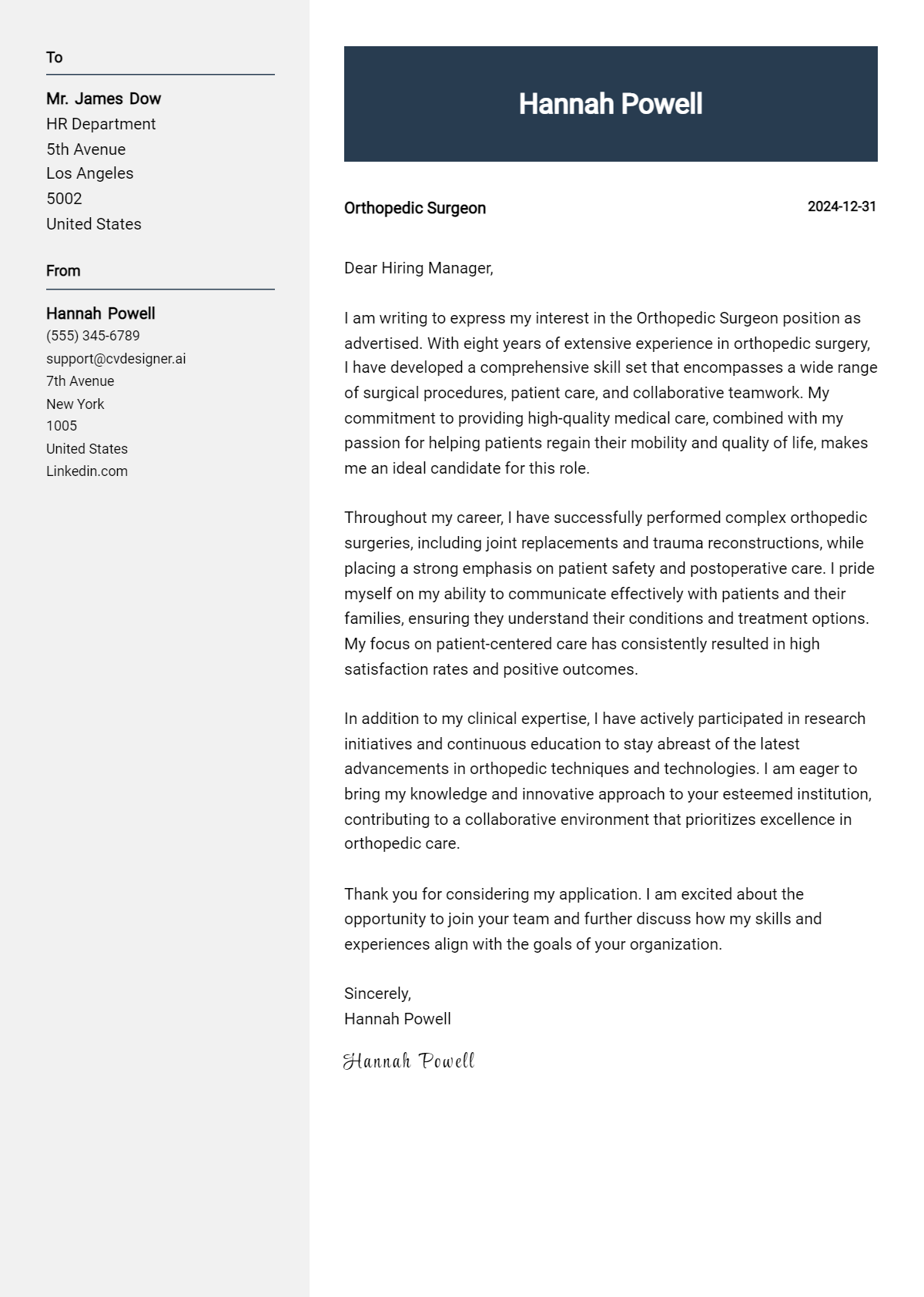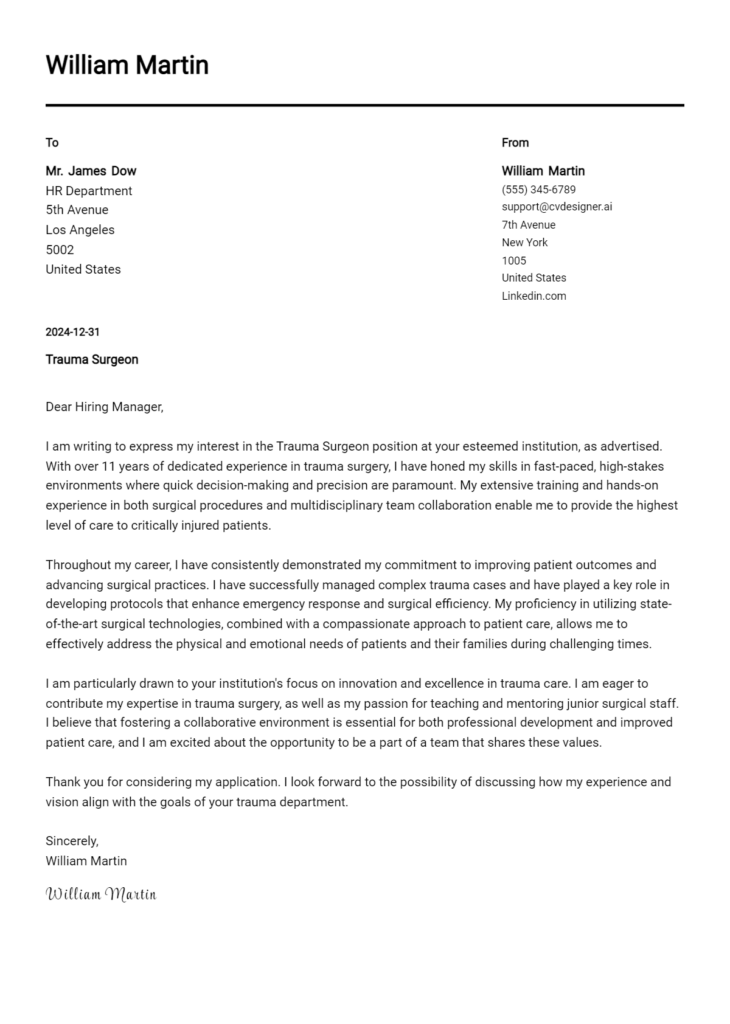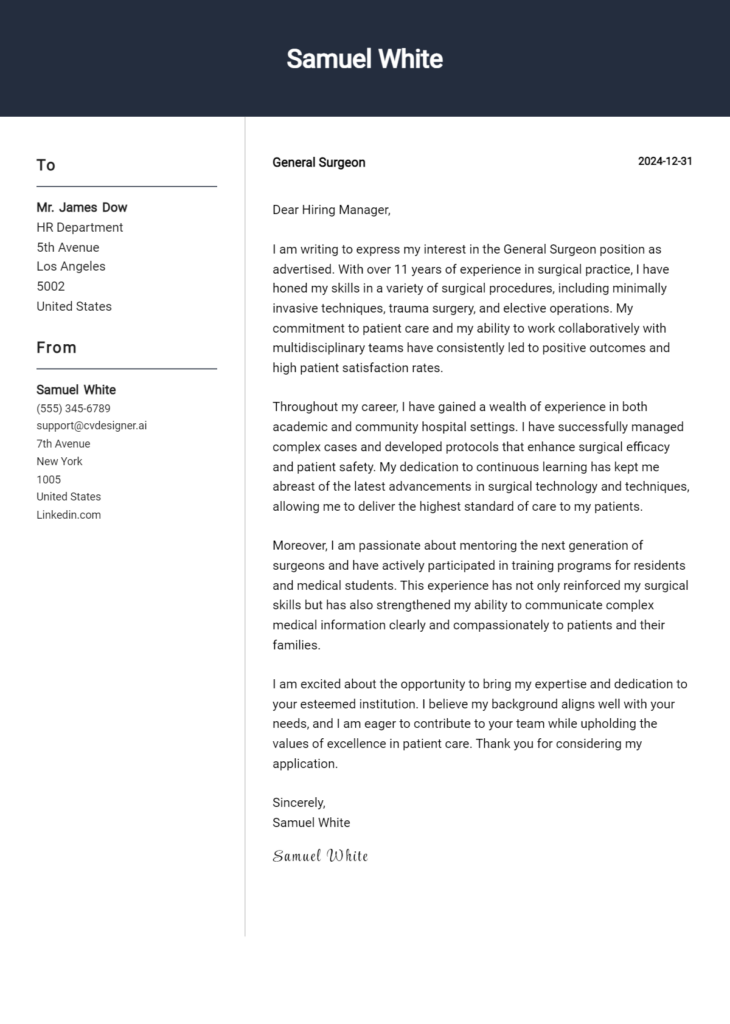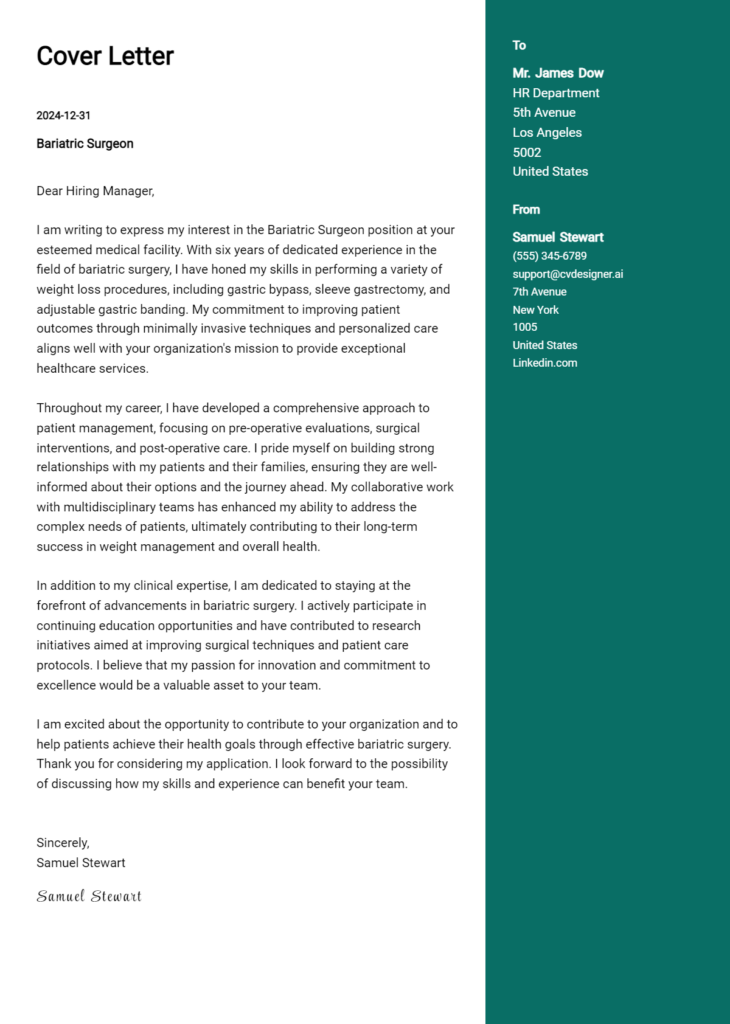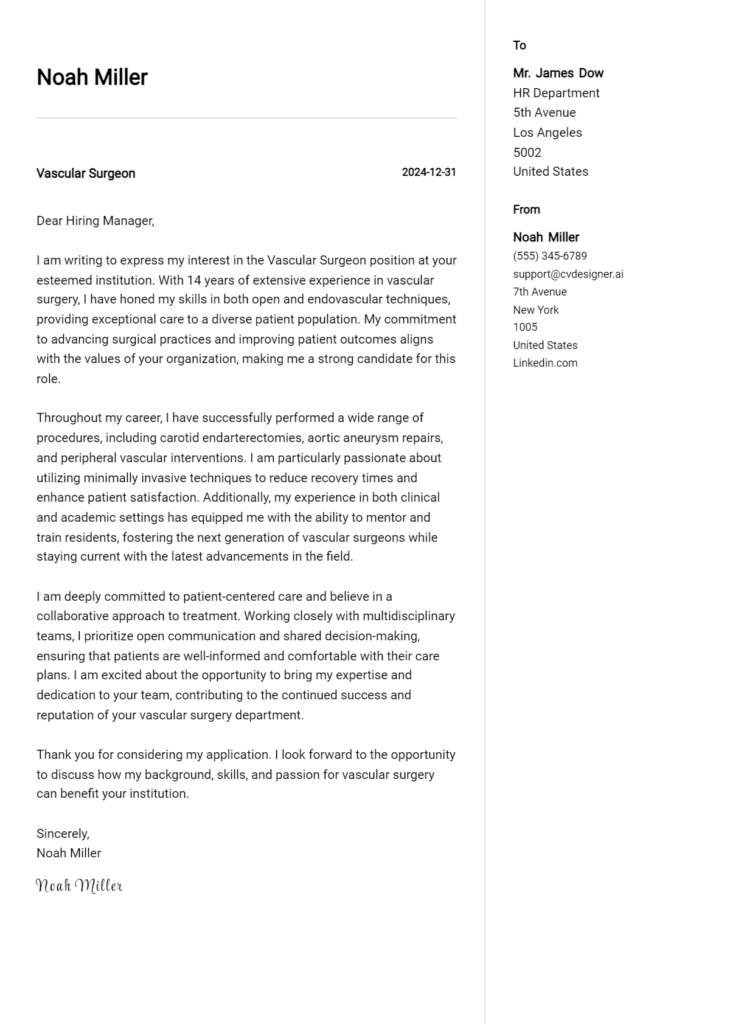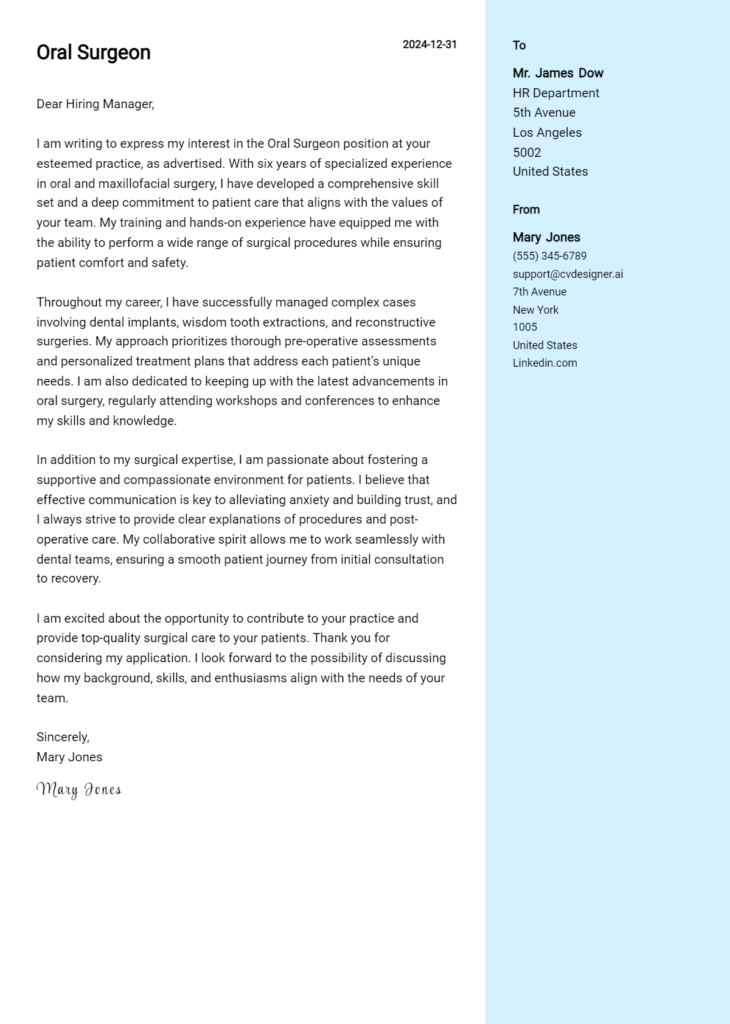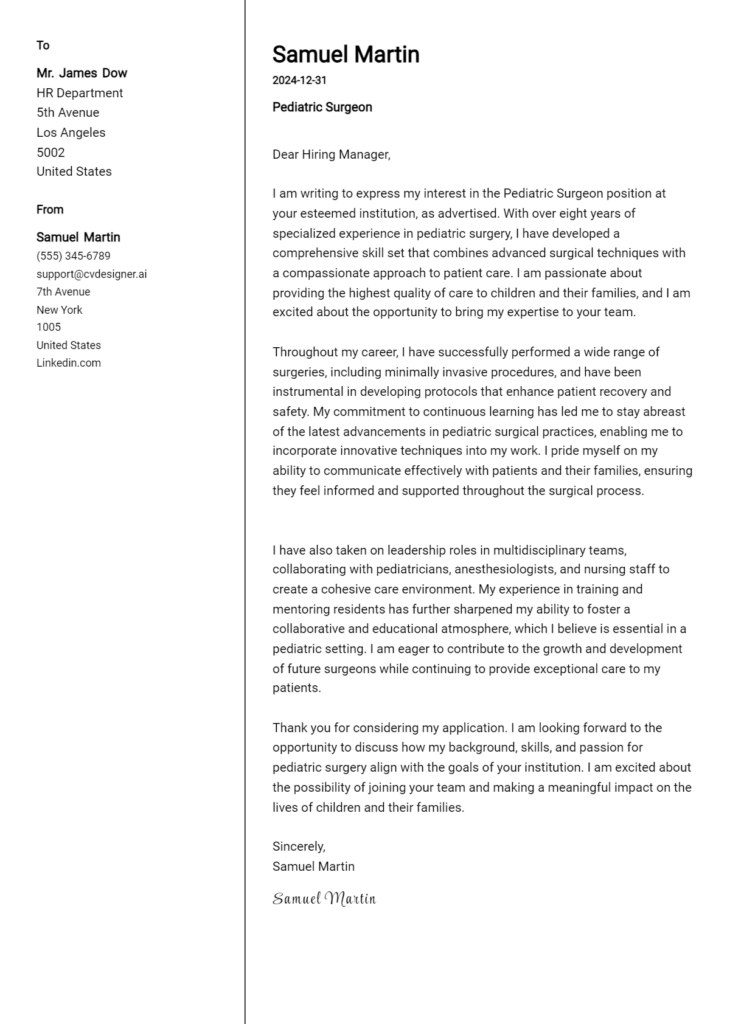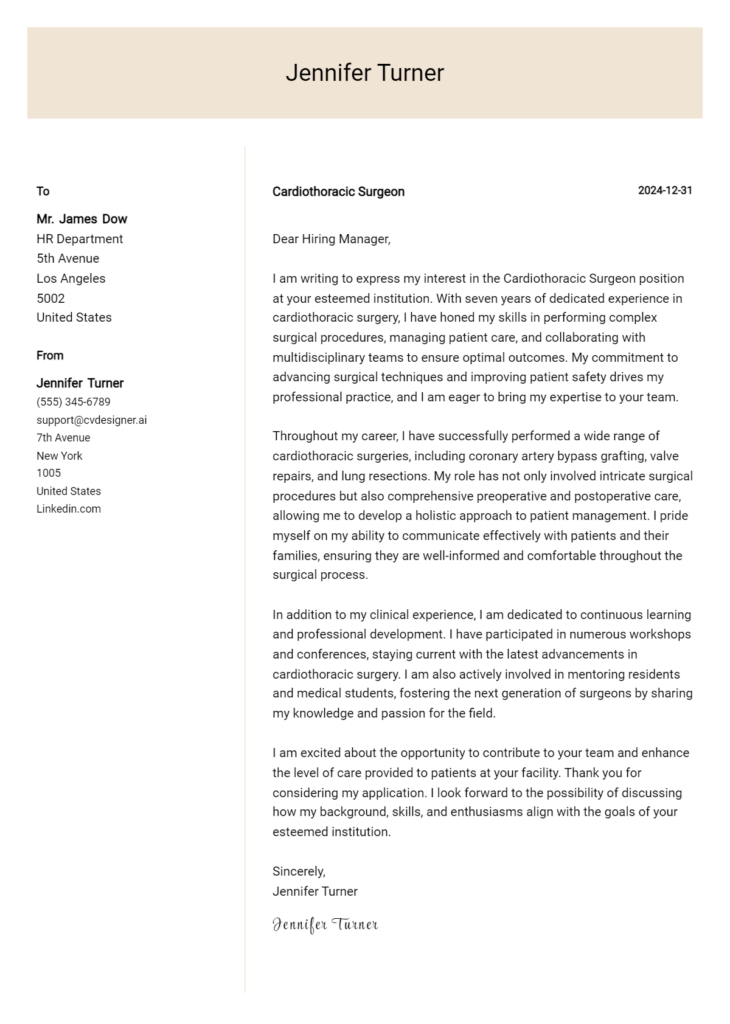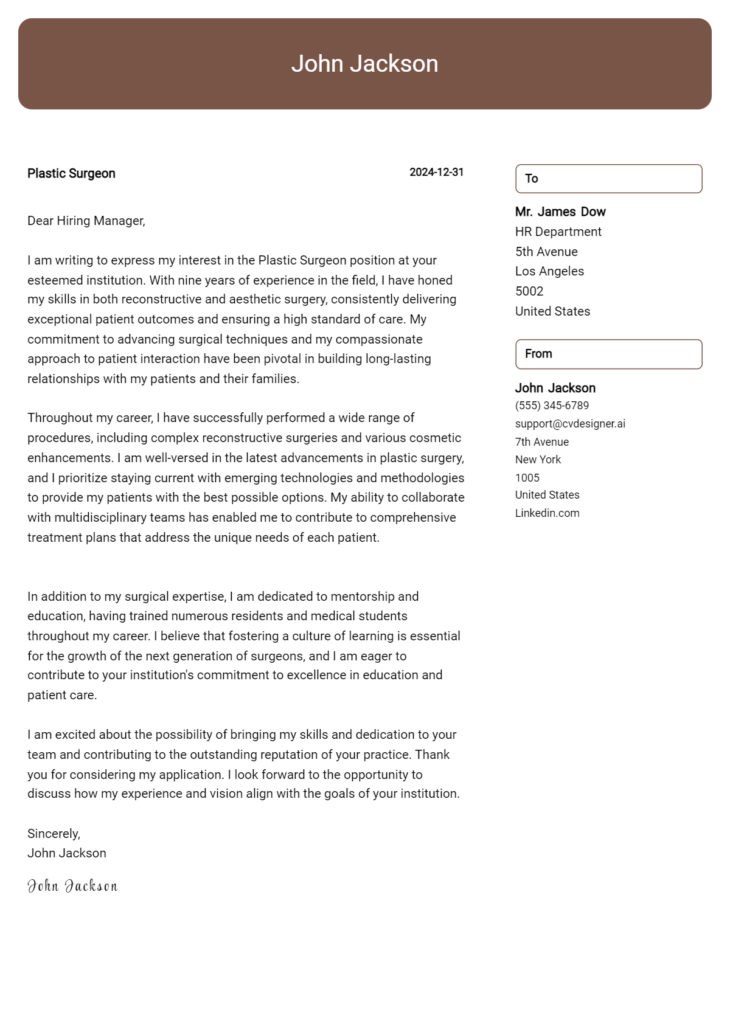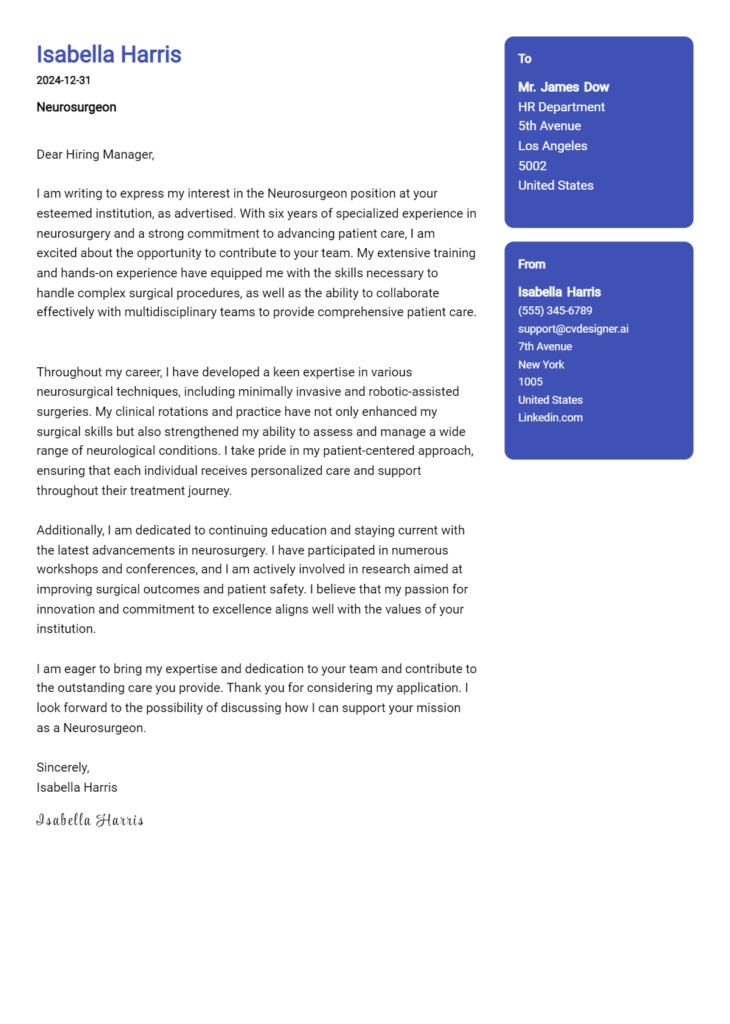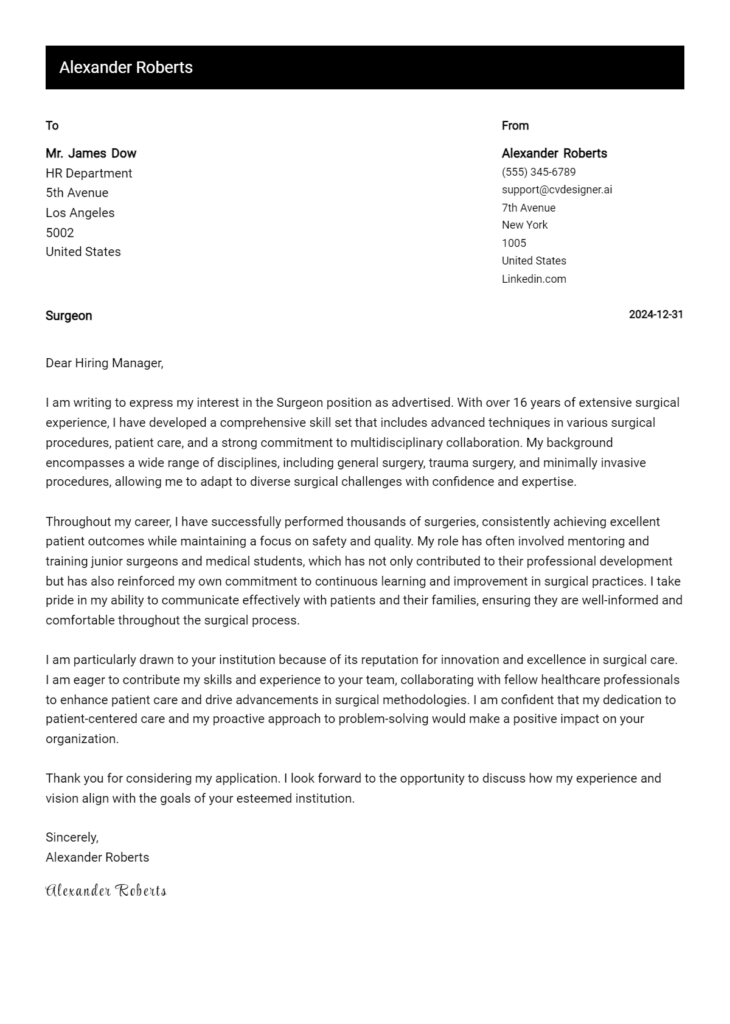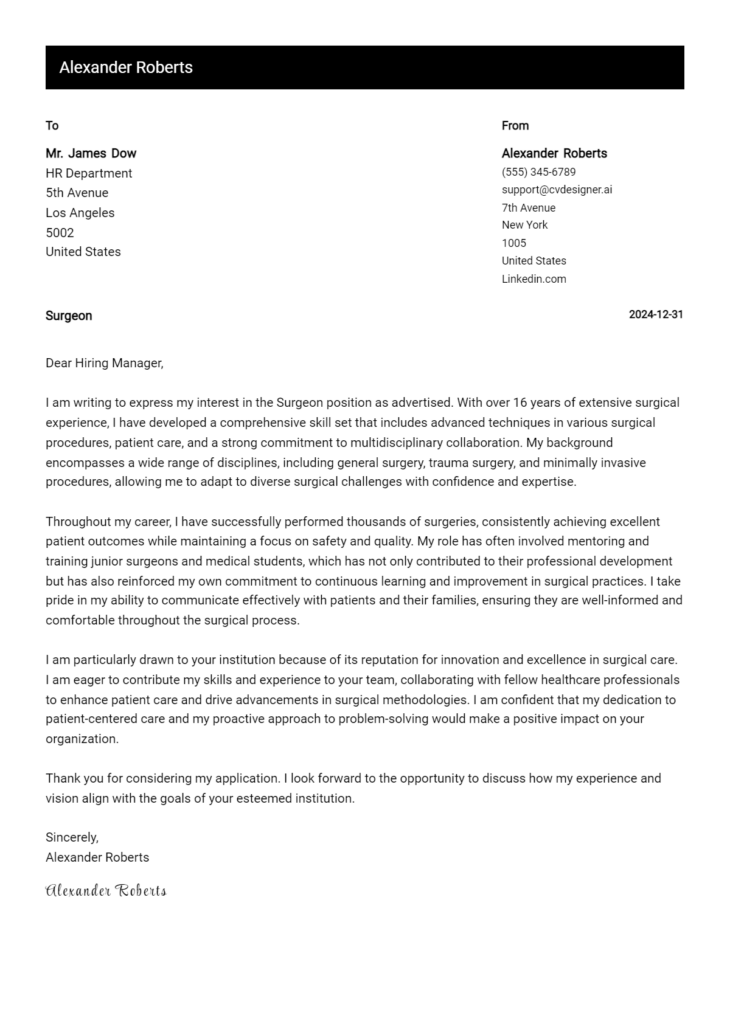Orthopedic Surgeon Cover Letter Examples
Explore additional Orthopedic Surgeon cover letter samples and guides and see what works for your level of experience or role.
How to Format an Orthopedic Surgeon Cover Letter?
Crafting a compelling cover letter is essential for orthopedic surgeons, as it serves as a first impression to potential employers and reflects your professionalism and dedication to patient care. The formatting of your cover letter not only showcases your qualifications but also demonstrates your ability to communicate effectively—a critical skill in the medical field. A well-structured cover letter can capture the attention of hiring committees and convey your passion for orthopedic surgery, while emphasizing your expertise and commitment to excellence in patient outcomes.
In this guide, we will explore the key components of a professional orthopedic surgeon cover letter, including:
- Cover Letter Header
- Cover Letter Greeting
- Cover Letter Introduction
- Cover Letter Body
- Cover Letter Closing
Each section is vital in presenting your qualifications and showcasing your commitment to the field. Let’s delve into the specifics of each part to ensure your orthopedic surgeon cover letter stands out.
Importance of the Cover Letter Header for an Orthopedic Surgeon
A well-structured cover letter header is essential for an orthopedic surgeon as it sets the tone for the application and reflects professionalism. The header should include the candidate's contact information, the date, and the recipient's details, ensuring clarity and easy reference. A clear and professional header not only establishes the applicant's identity but also demonstrates attention to detail, which is crucial in the medical field.
Strong Example
Dr. Jane Smith 1234 Healing Way Cityville, ST 12345 (123) 456-7890 jane.smith@email.com October 1, 2023 Hiring Manager Orthopedic Clinic 5678 Specialty Lane Cityville, ST 12345
Weak Example
Jane Smith 1234 Healing Way Cityville, ST 12345 Dear Hiring Manager,
The Importance of the Cover Letter Greeting for an Orthopedic Surgeon
The greeting of a cover letter plays a crucial role in setting the tone for the rest of the document. It serves as the first point of contact with the hiring manager and can create an immediate impression of your professionalism and attention to detail. By addressing the hiring manager directly, you demonstrate a level of personalization that can distinguish you from other candidates. To make a strong impact, it is essential to avoid generic greetings, such as "To Whom It May Concern," which can come across as impersonal. Instead, take the time to research the recipient's name and title, ensuring your greeting reflects a more tailored approach. This not only shows initiative but also establishes a connection that can resonate throughout your application.
Strong Greeting Example
Dear Dr. Smith,
Weak Greeting Example
To Whom It May Concern,
The Importance of a Well-Crafted Cover Letter Introduction for an Orthopedic Surgeon
A compelling cover letter introduction is crucial for an orthopedic surgeon seeking a position in a competitive field. This opening paragraph serves as your first impression, capturing the hiring manager's attention and expressing your genuine interest in the role. It is an opportunity to briefly highlight your key skills, experiences, or achievements that make you a strong candidate. A well-crafted introduction not only sets the tone for the rest of the letter but also encourages the reader to learn more about your qualifications. Below are examples of strong and weak cover letter introductions to illustrate the difference.
Strong Example
Dear Hiring Manager, I am excited to apply for the Orthopedic Surgeon position at [Hospital Name], as I believe my extensive experience in joint replacement surgery and my commitment to patient-centered care make me an excellent fit for your esteemed team. Over the past ten years, I have successfully performed over 1,500 orthopedic procedures, and I am dedicated to utilizing the latest surgical techniques to improve patient outcomes. My passion for advancing orthopedic practices aligns perfectly with the innovative approach at [Hospital Name], and I am eager to contribute to your mission of providing exceptional healthcare.
Weak Example
To Whom It May Concern, I am writing to apply for the Orthopedic Surgeon job. I have done some surgeries in the past, and I think I would be good at this position. I am interested in working at your hospital because it seems like a nice place to work.
Purpose of the Cover Letter Body for an Orthopedic Surgeon
The cover letter body for an Orthopedic Surgeon serves as a critical opportunity to present the candidate's qualifications in a compelling manner, effectively showcasing their skills, experiences, and the value they can bring to the healthcare organization. It allows the applicant to highlight specific projects or accomplishments that demonstrate their expertise in orthopedic procedures, patient care, and collaborative work with multidisciplinary teams. A well-crafted cover letter can differentiate a candidate from others by illustrating their unique contributions to previous employers, such as successful outcomes in complex surgeries or innovations in patient rehabilitation protocols.
Strong Example
Dear Hiring Committee, I am writing to express my interest in the Orthopedic Surgeon position at XYZ Hospital. With over ten years of experience in orthopedic surgery, I have successfully performed more than 1,500 joint replacement surgeries, achieving a patient satisfaction rate of 95%. One of my proudest accomplishments was leading a team that developed a novel protocol for minimally invasive knee arthroplasties, which reduced recovery time by 30% and significantly improved patient outcomes. I am eager to bring my expertise and innovative approach to your esteemed institution, enhancing the quality of care provided to your patients. Sincerely, Dr. John Doe
Weak Example
Dear Sir or Madam, I am applying for the Orthopedic Surgeon position. I have worked in hospitals for several years and have done many surgeries. I am good with patients and have some experience with joint replacements. I think I would do a decent job at your hospital. Best, Dr. Jane Smith
Importance of the Cover Letter Closing for an Orthopedic Surgeon
The closing paragraph of a cover letter is crucial for leaving a lasting impression on the hiring manager. It should succinctly summarize your qualifications, reiterate your enthusiasm for the orthopedic surgeon position, and encourage the reader to take the next step—whether it's reviewing your resume or scheduling an interview. A strong closing reinforces your suitability for the role and expresses your eagerness to contribute to the organization, while a weak closing may fail to inspire action or convey confidence.
Strong Example
In conclusion, my extensive training in orthopedic surgery, combined with my commitment to patient care and innovative treatment approaches, make me a strong candidate for this role. I am genuinely excited about the opportunity to bring my expertise to your esteemed practice and contribute to the health and well-being of our community. I look forward to the possibility of discussing my application in further detail and am eager to schedule an interview at your earliest convenience. Thank you for considering my application.
Weak Example
Thank you for reading my cover letter. I hope you find my resume interesting. If you want to talk, you can call me.
Crafting an effective cover letter is essential for orthopedic surgeon candidates looking to stand out in a competitive field. A well-written cover letter not only highlights your technical skills and problem-solving abilities but also demonstrates your understanding of the surgical development life cycle (SDLC), your capacity for teamwork, and your commitment to continuous learning. The following tips will guide you in creating a compelling cover letter that showcases your qualifications and passion for the role.
Tips for Writing an Effective Cover Letter for Orthopedic Surgeons
Highlight Your Technical Skills
Begin your cover letter by emphasizing your technical expertise in orthopedic procedures, surgical techniques, and relevant technologies. Mention specific skills such as arthroscopy, joint replacement, or trauma surgery, and provide examples of how you’ve successfully applied these skills in past roles.Demonstrate Problem-Solving Abilities
Orthopedic surgery often requires quick thinking and effective problem-solving under pressure. Share a brief anecdote that illustrates a challenging situation you faced in the operating room and how your critical thinking led to a successful outcome. This not only showcases your skills but also your ability to remain composed during high-stakes situations.Showcase Your Knowledge of the SDLC
Understanding the surgical development life cycle is crucial for an orthopedic surgeon. Discuss your familiarity with the phases of patient care—from assessment and diagnosis to treatment and follow-up. Convey your ability to adapt to evolving practices or technologies that enhance surgical outcomes.Emphasize Teamwork and Collaboration
Orthopedic surgery is a team effort that involves working closely with other healthcare professionals. Highlight your experience collaborating with anesthesiologists, nurses, and rehabilitation specialists. Provide examples of how your ability to work as part of a multidisciplinary team has improved patient care and outcomes.Express Your Passion for Continuous Learning
The field of orthopedic surgery is always advancing. Make sure to convey your commitment to continuous professional development. Mention any additional training, certifications, or workshops you’ve undertaken and how you stay updated on the latest research and surgical techniques. This demonstrates your dedication to providing the best possible care to your patients.
By incorporating these elements into your cover letter, you can create a powerful narrative that positions you as a qualified candidate for an orthopedic surgery role. For more assistance, consider using cover letter templates or a cover letter builder to help streamline your writing process.
Common Mistakes to Avoid in an Orthopedic Surgeon Cover Letter
Crafting a compelling cover letter is crucial for orthopedic surgeons aiming to make a strong impression on potential employers. Avoiding common mistakes can significantly enhance your chances of landing an interview. Here are some pitfalls to watch out for when writing your cover letter:
Generic Approach: Using a one-size-fits-all template can make your application seem impersonal. Tailor your letter to the specific role and hospital by addressing the hiring manager by name and mentioning the institution's values or recent achievements.
Ignoring Formatting Guidelines: Neglecting proper cover letter format can make your application appear unprofessional. Always adhere to a clear and organized cover letter format that includes a header, salutation, body, and closing.
Overly Complex Language: Using complicated medical jargon can alienate readers who may not be familiar with specific terms. Aim for clarity by using straightforward language that highlights your qualifications without overwhelming the reader.
Lack of Specific Examples: Failing to provide concrete examples of your skills and experience can weaken your case. Include specific instances of successful surgeries, patient outcomes, or team collaborations to showcase your expertise.
Focusing Solely on Yourself: While it's important to highlight your qualifications, neglecting to demonstrate how you can benefit the organization is a common mistake. Align your skills with the needs of the institution, showing how you can contribute to their goals and patient care.
Neglecting Proofreading: Spelling and grammatical errors can undermine your professionalism. Always proofread your letter multiple times and consider having a colleague review it as well.
Missing the Call to Action: Failing to include a clear call to action can leave your application feeling incomplete. Conclude your letter by expressing your eagerness to discuss your application further and suggesting a follow-up.
By steering clear of these common errors, you can create a standout cover letter that effectively showcases your qualifications and aligns with the expectations of orthopedic surgery hiring committees. For inspiration, check out some cover letter examples to see how successful candidates present their skills and experiences.
Cover Letter FAQs for Orthopedic Surgeon
What should I include in my cover letter as an orthopedic surgeon?
In your cover letter, you should highlight your medical education, residency training, and any fellowships relevant to orthopedic surgery. Mention specific areas of expertise, such as joint replacement, sports medicine, or trauma care. Include your approach to patient care and any notable achievements, such as research or leadership roles in professional organizations. Tailor your letter to the specific institution or practice you are applying to, demonstrating your knowledge of their work and values. Finally, express your enthusiasm for joining their team and how your skills align with their needs.
How can I demonstrate my skills and experience effectively in my cover letter?
To effectively demonstrate your skills and experience, use specific examples that illustrate your expertise in orthopedic surgery. Discuss cases where you made significant impacts, such as successful surgeries or innovative treatment plans. You can also include metrics like patient satisfaction rates or recovery outcomes that showcase your effectiveness. Additionally, mentioning your involvement in multidisciplinary teams or community outreach can highlight your collaborative approach and commitment to patient care. Ensure your narrative flows logically, connecting your experiences to the qualifications sought by the employer.
Should I address the cover letter to a specific person or use a general greeting?
Whenever possible, address your cover letter to a specific individual, such as the hiring manager or department head. This personal touch demonstrates your initiative and genuine interest in the position. Research the organization to find the appropriate person; if you cannot locate a name, a general greeting like "Dear Hiring Committee" is acceptable. Avoid overly generic salutations such as "To Whom It May Concern," as they can suggest a lack of effort in your application. Personalization can make a positive impression and set your application apart.
How can I ensure my cover letter stands out among other applicants?
To make your cover letter stand out, focus on showcasing your unique qualifications and personality. Start with a compelling opening that captures attention, such as a brief anecdote or a statement about your passion for orthopedic surgery. Use clear, concise language and avoid jargon, ensuring your message is accessible. Tailor your content to reflect the specific needs and values of the organization, demonstrating how you can contribute to their goals. Finally, conclude with a strong statement expressing your eagerness to discuss your application further, leaving a lasting impression.
Build your Cover Letter in minutes
Use an AI-powered cover letter builder and have your letter done in 5 minutes. Just select your template and our software will guide you through the process.

